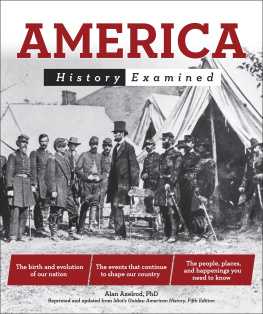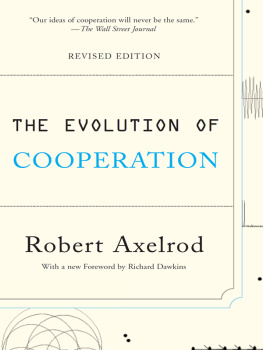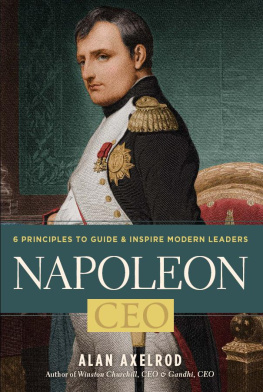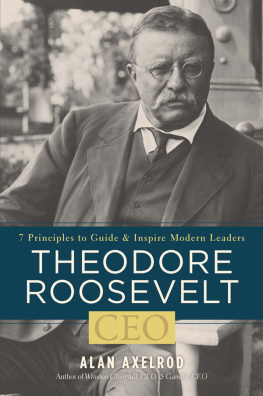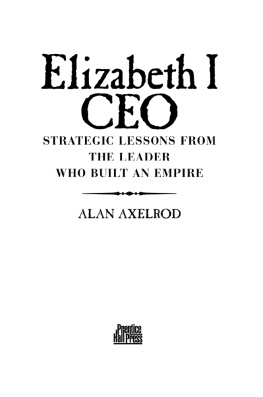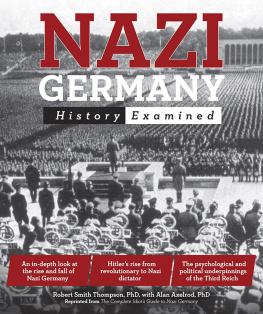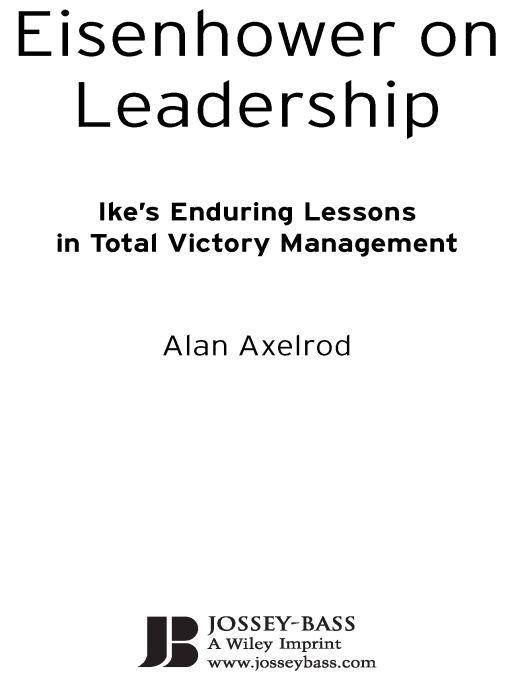Table of Contents
Foreword
Peter Georgescu
Intelligence can be defined as the ability to observe seemingly nonexistent patterns. Alan Axelrod has reviewed Dwight David Eisenhowers extraordinarily brilliant deeds in preparation and action on the battlefield and deftly relates them to the business arena.
In a fascinating way, Eisenhower was a manager ahead of his time. His strength and style were also extraordinarily well suited for the twenty-first century. In tomorrows world, businesses will encounter tremendous challenges. The twenty-first century will be defined by global competition and excess supply. The net result will be an explosive increase in the number of enterprises attempting to chase fewer consumers with predominantly commodity products. As a consequence, business will face ferocious price competition and an increasing casualty rate among companies big and small.
In this unforgiving economic environment, Eisenhowers core strengths shine. Clearly and rigorously articulated strategies will become imperative. And every enterprise employee must become a creative contributor, engaged in serving customers and consumers. All egos must be fed yet kept under control, and personal agendas must be sublimated to the common good of the enterprise. This is where Alan Axelrods Eisenhower on Leadership takes on powerful meaning and relevance. The greatest military invasion in human history required all the twenty-first-century business skills. Unambiguous strategies, flexibility combined with decisive action, fanatical commitment to objectives, and ego management (of Patton and Montgomery, for example)these qualities and skills, among so many others, make Eisenhower a towering leader in our own times. It is no accident that Ike, for all his position and power, had a low-profile persona. He understood the power of we and willingly and capably subjugated the I word. In page after page of this book, we see alluring results unfold. It is a masterful tale of competence and wisdom told against the backdrop of the most brilliant and fascinating war history of modern times.
Fate enabled me to appreciate a seldom publicized side of Ike Eisenhowerthat of the compassionate human being. I was one of two brothers separated from their parents by the capricious events of the postWorld War II era. In 1947, my father and mother, two Rumanian nationals, came to the United States to visit my fathers headquarters offices in New York City. My dad ran the Ploesti oil fields for ESSO International, and had just come out of being imprisoned by the Nazis as an Allied sympathizer in Rumania during the war. While in New York, the Iron Curtain fell. The Communists, with Soviet support, took over Rumania. Instantly my father was labeled a capitalist and an imperialist, and sentenced in absentia to life imprisonment. Obviously, my parents had to remain in the United States. Back in Rumania, my grandfather, an eighty-year-old elder statesman, was arrested and eventually killed in one of the Communist gulags. My brother and I were incarcerated and placed in a hard labor camp. We worked ten-hour days, six days a week, no schooling. I was nine years old when this ugly chapter started.
Then a miracle happened. The Communists went to see my father in New York, demanding that he spy for the Soviets in return for keeping us alive. After a tortuous day and night, with help from the FBI, my parents refused and went public with the story. A scandal of global proportions exploded. My father had by now become an American citizen, and the Soviet blackmail attempt turned into a political cause clbre. With the help of Congresswoman Francis Payne Bolton, Ike Eisenhower personally intervened in the case. The story I heard later suggested that President Eisenhower had agreed to trade a couple of Russian spies for my older brother and me, by then a fifteen-year-old.
Indeed, Ike Eisenhowers lessons in leadership took on a very special meaning in my life.
INTRODUCTION
The Soldier as CEO
Dwight David Eisenhower never led a single soldier into battle. Before World War II, he had never even heard a shot fired in anger. His only combat wound was the bad knee, weakened by a West Point football injury, that he twisted helping push a jeep out of the Normandy mud. Yet it was Ike Eisenhower who, as supreme Allied commander in Europe, was responsible for leading the greatest military enterprise in history. Millions of American, British and Commonwealth, Free French, and other soldiers, sailors, and airmen looked to him and answered to him in a struggle for nothing less than the salvation of the world.
Eisenhower was a desk soldier, but he always tried to move his desk as close to the action as he could. Although he was an accomplished strategist, having been educated at the Command and General Staff School and the Army War College, the strategies by which the Allies fought World War II were primarily the work of others. It was others, too, who had the job of executing the strategies, others who actually led the troops into battle. Nevertheless, most of the commanders and politicians who made the history of the war as well as the journalists and scholars who subsequently wrote it agreed: Eisenhower was at the heart of victory.
It was, in a favorite Allied phrase, total victory. It could be justly said that Eisenhower led that total victory, but it would be even more accurate to say that he managed it. For Ike Eisenhower was a new kind of military leader uniquely suited to war on an unprecedented scale, a scale that dwarfed even the Great War of 1914- 1918. His task was not to lead men into battle but to lead those who led men into battle. As supreme Allied commander, he was the commander of the commanders. Yet nobody knew better than Eisenhower that although he had greater responsibility than any other Allied military leader, he had less absolute authority than any other high-level commander. Whereas any three-star general could order the two-star below him to do this or that, four-star (and, later, five-star) Eisenhowers subordinates were the top commanders of the U.S., British (and Commonwealth), and Free French armies. They answered, first and foremost, to their own political leaders as well as to their own military judgment. By consensus of the Allied heads of state, they agreed to be led by Eisenhower, yet he was ultimately answerable to them as well as to all the political leaders to whom they answered. The authority and the weight of the big decisions finally rested on Eisenhower, but those decisions could be arrived at only through a process of compromise and consensus. Although Eisenhowers leadership authority derived from the very highest international levels of government, it had no formal legal basis, and ultimately it was sustained by nothing more or less than the ongoing consent of those he led.
If Ike Eisenhowers situation was unique for a military man, it wasand remainscommon enough for leaders in the civilian sphere. His position was analogous to that of a CEO or, indeed, any high-level manager in a large and complex enterprise. It was a position complexly compounded of awesome authority and what can best be described as equally awesome subordination of authority. Both a leader and a servant, he was a servant leader, expected to act as master while answering to many masters. He was, in short, a manager, in the most modern sense of the word, charged with leading, coordinating, prioritizing, judging, and cajoling others toward the common goal of total victory.





